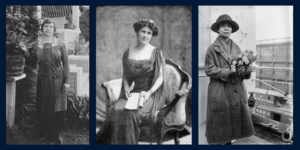 I am always pleased to stumble on an obituary for a woman who died long ago printed in the New York Times. The Times has been belatedly publishing these obituaries to make amends for overlooking the accomplishments of women in the past. Here are the stories of three more women who are new to me.
I am always pleased to stumble on an obituary for a woman who died long ago printed in the New York Times. The Times has been belatedly publishing these obituaries to make amends for overlooking the accomplishments of women in the past. Here are the stories of three more women who are new to me.
Charlotta Bass (1880–1969)
Charlotta Bass was the first Black woman to run for vice president of the United States on the Progressive Party ticket in 1952. Jessica Bennett of the New York Times notes that Bass’s shoulders are one of many that Kamala Harris now stands on. Even though Bass knew the chances of winning were small, her campaign slogan was “Win or Lose, We Win by Raising the Issues.”
Bennett notes that Bass led a remarkable life as an activist and journalist. Born in Sumpter, South Carolina, around 1880 to Kate and Hiram Spears, descendants of enslaved people, she moved to Rhode Island to attend college, then to Los Angeles, where she had a long career as editor and publisher of the California Eagle, the West Coast’s oldest Black newspaper. In the Eagle she denounced The Birth of a Nation, the movie made in 1915 that glorified the Ku Klux Klan. She used the paper to fight for equality for Black people in hiring and housing, along with other civil rights and labor issues. Her positions were considered radical at the time. She became the subject of government surveillance and was labeled “disloyal,” but she was able to bring many social justice issues into the national spotlight through publishing and running for state and national office.
Inez Milholland (1886–1916)
Inez Milholland was an ardent and talented advocate of women’s suffrage who was never mentioned in my history books. Meredith Mendelsohn, writing for the New York Times, shares that Milholland collapsed and died at the age of thirty after delivering fifty speaking engagements in eight states in twenty-eight days, where she urged her audiences to vote against Woodrow Wilson and for his opponent who supported suffrage. She pushed herself through illness to her detriment as she fought passionately for women’s rights, racial equality, labor reform, and prison reform and against WWI. The year she died, she led eight thousand women up Pennsylvania Avenue in Washington, DC, during the first major suffrage parade.
Mabel Ping-Hua Lee (1895–1966)
Jia Lynn Yang writes that Mable Ping-Hua Lee stood out in 1912 as one of the leaders of one of the largest marches for women’s suffrage in the nation. She and a brigade of women on horseback led ten thousand people through the streets of New York City on a march for women’s right to vote. Lee stood out as a highly unusual suffragist as a Chinese immigrant.
Lee arrived in the United States from China in 1905 to join her missionary parents when she was ten. Very few Chinese were allowed into the United States at that time because of the Chinese Exclusion Act of 1882, which was not repealed until 1943.
While Lee’s mother seldom left their home in Chinatown because of her bound feet, Lee earned a doctorate in economics from Columbia University, published articles, and gave speeches in which, according to Yang, “she articulated a bold, transnational vision for democracy based on Christian values of equality.” She argued that suffrage was extending “democracy to women.”
Lee never realized her dream of returning to China to help liberate Chinese women, but she did help bring the right for women to vote in her adopted country.
Let’s take a moment to learn about the women who have helped pace the way for us.
Photo courtesy of Wikipedia Commons, Library of Congress, and George Grantham Bain (all public domain)